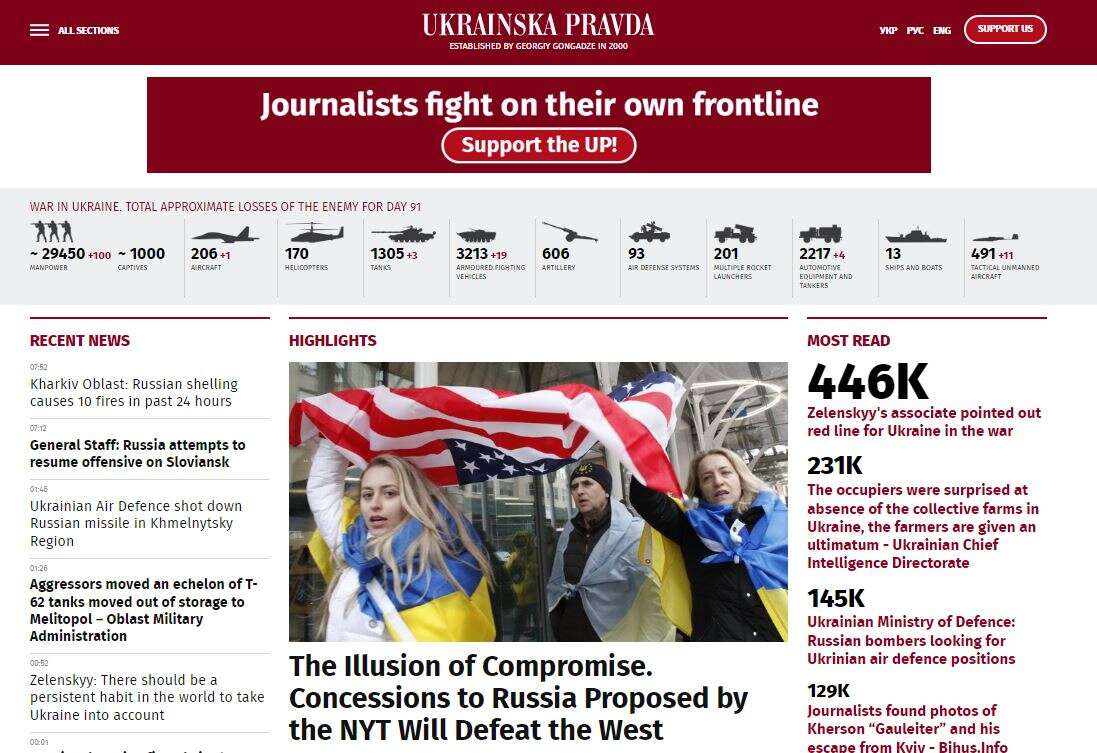
The CEO of Ukraine’s leading independent news website has warned that the actions of Google and Facebook in his country are harming the sustainability of independent news.
Andrey Boborykin was interviewed by Press Gazette for the second edition of weekly podcast The Future of Media Explained which looked at resilience and Ukraine media.
As well as being CEO of Ukrainska Pravda, Boborykin is an analyst with the Media Development Foundation which has investigated the plight of local media in Ukraine.
It found that only 18% of local newsrooms in Ukraine had cut staff since the war began but that most (70%) were running out of money because the country’s advertising market has come to a halt.
Boborykn is appealing for donations and grant aid to help Ukraine media.
But he believes, as many publishers in the UK do, that the world’s digital media duopoly of Google and Meta/Facebook could have a key role in reviving revenues.
Boborykin’s site has around 100 staff and attracts some 25m unique users a month making it one of the biggest independent news brands in Ukraine.
He says that, as with UK and US media, Ukrainian news publishers have struggled with Google and Facebook taking classified and display advertising revenue. The difference for publishers in Ukraine is that they were starting from scratch in 1990 following the collapse of the Soviet-controlled system.
He says: “All the ad money has moved on to the platforms and it’s even worse on the local level than on the national level.”
Google and Meta have distributed hundreds of millions of dollars worth of funding to publishers around the world in recent years via grants and payments for content.
But Boborykin says Ukrainian media has seen none of their largesse because its population is declining and it is neither a big revenue stream or a growing one for the Duopoly (unlike developing nations such as Nigeria and Kenya).
He says that interventions from Facebook and Google have actually harmed Ukrainian media since the Russian invasion three months ago.
He said that for instance publishers in Luhansk and Donetsk are unable to use Facebook advertising to promote their activities because Facebook has suspended all advertising activity in these regions.
“That means that if a publisher decides to grow its Facebook page or WhatsApp channel, they will not be able to do so because they are considered a publisher from a restricted territory,” he said. “And that’s a big problem for us because we have already found certain funds to help publishers boost distribution and we cannot do anything for over 30 publishers from the eastern part of Ukraine.”
He said that Google-owned Youtube is the biggest media platform in Ukraine with most people in the country using it every day. But he said advertising has been suspended on videos relating to current affairs in Ukraine, which has led to a big drop in revenue for publishers.
His own publisher’s Youtube channel generated 60m views in April. Before the war that would have translated into revenue of $30,000, he said, but last month it was closer to $5,000.
So far Ukrainska Pravda has managed to avoid making redundancies, but grant funding from donor organisations is now needed if news organisations are to survive the six to nine months that most expect the war to last.
He said: “Publishers need grants now to sustain operations because the ad market has fallen 90% since the war started.”
Listen to Press Gazette’s interview with Andrey Boborykin in full and subscribe to The Future of Media Explained weekly podcast here.
Facebook told Press Gazette that it had expanded its fact-checking capacity in Russian and Ukrainian languages across the region and also provides grants to fact-checking partners in Ukraine and neighbouring countries.
Google says it has provided cyber security protection to help news organisations in Ukraine, it has provided grants to fight disinformation and also provided training for journalists in Ukraine.
Ukrainian publishers can also apply for support via the new European Innovation Challenge.
Email pged@pressgazette.co.uk to point out mistakes, provide story tips or send in a letter for publication on our "Letters Page" blog
